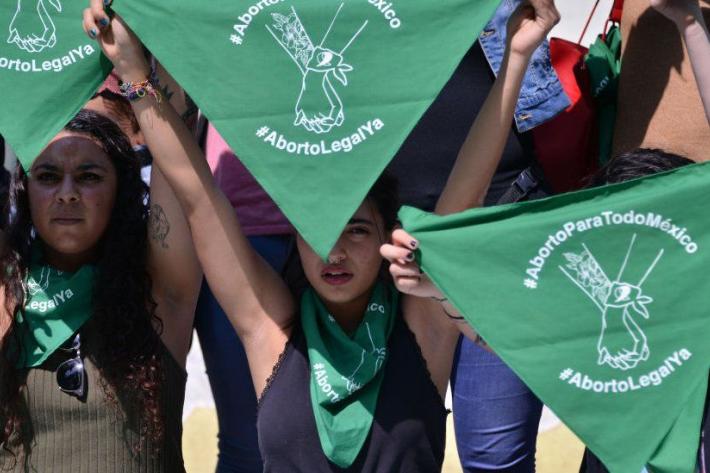Latest press releases
A selection of stories from across the Federation

Netherlands
Rutgers triumphs in landmark court case against lies, online hate and disinformation
Rutgers, the Netherlands’ leading sexual and reproductive health expert and IPPF’s Member Association, has today secured a landmark legal win against an ultra-conservative group.
For media enquiries


| 17 November 2022
UK Autumn budget doesn't go far enough
If you are covering the UK autumn budget and reporting on foreign aid, you may find the below statement from the International Planned Parenthood Federation (IPPF) helpful: “The UK government has already decimated the aid budget and its reputation through severe economic mishandling, cutting billions from the very things that protect people during economic, political and social upheaval, including life-saving sexual and reproductive healthcare. “It is also the only country to be spending the majority of its dedicated overseas aid budget within its own borders, taking advantage of legislation to pay for refugee and asylum costs in the UK rather than increasing domestic and overseas budgets accordingly. “The UK government cannot continue to fight the fire of one humanitarian crisis by diverting much-needed resources from other vulnerable people, nor continue to balance its books on the backs of the poorest people in the world - who, as MP Andrew Mitchell stated, will be damaged, maimed, or die as a result. “This government promised to give women and girls the freedom they need to succeed and prevent the worst forms of human suffering worldwide. If it is to deliver on its promises and revive its sunken reputation, it must spend dedicated budgets correctly, support people in the UK and beyond appropriately, and MP Andrew Mitchell and the Chancellor must ensure a return to the 0.7% as soon as possible.”

| 10 March 2022
Statement on the U.S Congress' FY22 spending bill which fails to permanently repeal the global gag rule
U.S congressional leaders have announced they have reached a final spending deal for the fiscal year 2022. This bill results from months of negotiations over funding and policy decisions, including those that impact sexual and reproductive healthcare globally. Despite the inclusion of language to permanently repeal the global gag rule passed in the House and introduced in the Senate, the final legislation fails to permanently end the harmful policy that has destroyed the lives of women and girls around the world for so many years. It also does not remove discriminatory abortion bans like the Hyde, Helms, and Weldon amendments or include much-needed new investments in sexual and reproductive healthcare and international family planning programs. Dr Alvaro Bermejo, Director-General of the International Planned Parenthood Federation, said: “We are outraged to learn that the long-awaited U.S spending bill failed to permanently repeal the global gag rule, nor did it include other areas of sexual and reproductive health and rights progress on which advocates had built strong momentum. The bill fell foul to anti-choice Congress members whose primary goal is to control the bodies and reproductive rights of women and girls they will never know, whose lives they could never imagine. “Failure to utilize this golden opportunity risks the continuation of the flip-flopping of American policy that has played with the lives of millions across the globe for nearly 40 years. Ultimately the global gag rule destroys long-term access to lifesaving contraception, maternal health and HIV/STI services and forces vulnerable women and girls to carry pregnancies to term or make the agonizing decision to get a potentially deadly unsafe abortion. It also manipulates the ability of international organizations, like IPPF, to use their own funding to provide legal, safe abortion, which unethically denies women care and imposes neo-colonial policies around the world. “While the global gag rule poses serious challenges to sustained engagement with USAID, especially at a time when anti-choice movements continue to attack the rights of people worldwide, IPPF is grateful to the Biden-Harris administration for the current rescission of the policy. We will continue to engage with U.S Government global health assistance programs when possible. We are also thankful to our relentless Member Association, the Planned Parenthood Federation of America. Despite the challenges, they have worked tirelessly alongside thousands of women’s rights campaigners across the United States and worldwide to advocate for vulnerable women and girls everywhere. The fight for reproductive rights and justice will not end until every person can access high-quality sexual and reproductive healthcare when and where they need it.” Santos Siminone, Executive Director at Associação Moçambicana para Desenvolvimento da Família (AMODEFA), said: “We are deeply saddened by the failure to permanently repeal the Global Gag Rule. For AMODEFA, IPPF’s Member Association in Mozambique, a national provider of sexual and reproductive healthcare in the country since 1989, the impact of the global gag rule meant a $2 million gap in funding - about 60% of our total budget. “The impact was almost instantaneous, forcing the closure of six programs across 12 districts in Mozambique. This denied nearly 390,000 clients access to contraception, STIs, HIV, malaria, and tuberculosis services. Almost every local population was affected, with closures impacting adolescents, youths, women, and marginalized people. “For the people we serve, the permanent repeal of the policy would have meant an end to the violation of human rights. It would have meant dignity and that women’s lives would no longer be at risk. It would have meant an end to fear, pain, tears, and chaos, especially for black and brown women from low-income countries who bear the brunt of restrictive abortion policies.” For media enquiries, please contact Karmen Ivey on [email protected] or [email protected]

| 24 February 2022
Statement on the escalating conflict in Ukraine
Following the disturbing reports coming out of Ukraine, IPPF has released a media statement on behalf of the Federation and its Member Association in Ukraine. Despite the fact that sexual and reproductive healthcare (SRHR) needs increase significantly during conflict and humanitarian situations, the significant vulnerabilities of affected populations and displaced people are often overlooked, especially the experiences of women, girls and marginalized populations who are at increased risk of unintended pregnancy, sexually transmitted infections and sexual and gender-based violence. IPPF’s Director-General, Dr Alvaro Bermejo, said: "The International Planned Parenthood Federation (IPPF) is deeply concerned about the escalation of conflict in Ukraine. We take our responsibility to preserve the enormous gains made in life-saving sexual and reproductive healthcare across the country very seriously, especially for women, girls and marginalised populations, whose vulnerability and experiences are so often overlooked in humanitarian situations. "For 20 years, IPPF has consistently worked to strengthen and protect the reproductive rights of people in Ukraine, working in the frontline conflict zones of Lugansk and Donetsk since 2014, training medical specialists to provide life-saving reproductive healthcare, psychosocial support and quality care to survivors of sexual and gender-based violence. “Our teams are now contingency planning across the region to address not only the needs of those still in Ukraine, but also the millions who are likely to be displaced by the conflict and who will require critical support to continue accessing healthcare. We will work closely with partners and other NGOs to ensure the least possible disruption to services. "IPPF stands in solidarity with the international community and the brave people of Ukraine who for the last eight years have faced terrifying and difficult circumstances that nobody should ever have to suffer through. We stand by IPPF's frontline team, who, despite the dangers, continue to facilitate life-saving healthcare for those who need it most. We will be monitoring the situation closely to ensure the safety of our colleagues across the region.” For European outlets, please contact [email protected] For UK and other international media outlets, please contact Karmen Ivey on [email protected] or [email protected]

| 22 February 2022
Colombia decriminalizes abortion
Today, the Colombian Constitutional Court decriminalized abortion up to 24 weeks in another victory for the Green Wave sweeping through Latin America. The historic decision follows years of campaigning by women's right's activists across Colombia and came off the back of two lawsuits that asked the court to declare article 122 of the penal code, that "the woman who causes her abortion or allows another to cause it, will incur a prison sentence from sixteen (16) to fifty-four (54) months" as unconstitutional. The court called an extraordinary meeting today, Monday 21st February, and took just a few hours to come to its decision which will go into effect immediately. ProFamilia, the International Planned Federation's Member Association in Colombia, and Colombia's largest provider of legal abortion care were heavily involved in pushing to extend the rights of those needing to access abortion care. Marta Royo, Executive Director for Profamilia, IPPF's Member Association in Colombia, said: "Today is a ground-breaking moment for the people of Colombia and a long-overdue guarantee of reproductive rights and dignity for all those who need abortion care, especially poor and rural women who bear the brunt of restrictive abortion policies. "The decriminalization of abortion up to 24 weeks in Colombia and the Green Wave movement across Latin America is centred not just on public health, but also the full lives, citizenship and human rights of girls, adolescents, and women – who, for multiple reasons, including inequity, access to education, gender-based violence and barriers to healthcare – continue to face unintended pregnancies. "The freedom for women to finally make their own choices about their pregnancies and their bodies is fundamental to disrupting the cycle of poverty that so many in Colombia face. This monumental decision is also a win for the dedicated health care providers, who will finally be recognized as people who simply care about the needs of others." While Colombian women have supposedly been able to access abortion care since 2006 under three circumstances: if their life or health is at risk, in cases of fatal foetal abnormalities, or if the pregnancy is the by-product of rape or incest, in reality, the criminalization of abortion persisted. The Guttmacher Institute found that less than one per cent of the estimated 400,000 abortions carried out each year in Colombia are performed legally, with women, especially poor, rural, vulnerable and marginalized women, facing significant barriers to accessing safe and timely abortion care. Many Colombian women are instead forced to carry their pregnancies to term or else seek other methods to end them. Figures collected by ProFamilia showed that during 2020, there were at least 26,223 unsafe abortions across Colombia, a startling amount for which consequences range from infection to life-changing injuries to death. As per the previous abortion law, other women have been imprisoned for up to four and a half years for having an abortion, even in cases where abortion should have been legal. In a shocking example of discrimination, data collected showed that poor rural women were more likely to be charged, with a third of those who faced charges also survivors of sexual violence. Eugenia Lopez Uribe, IPPF's Regional Director for Americas and the Caribbean Region, said: "Today Colombia took another step in the right direction for gender equality and full human rights for all, and we are incredibly proud of IPPF's Member Association, ProFamilia, for their tireless work alongside thousands of activists across Colombia and Latin America "This 24-week decriminalization is historic in the region and especially remarkable when we consider the current fragility of abortion rights globally and the anti-choice movements which continue to plague nations across the world, including in countries close to home like the United States of America. "While today we are celebrating this historic decision, the Green Wave is strong and growing, and the fight for reproductive rights and justice will not end until every person can access high-quality sexual and reproductive healthcare when and where they need it." For media enquiries in English, please contact Karmen Ivey on [email protected] or [email protected] For media enquiries in Spanish or during UK night-time hours, please contact Pamela Martin Garcia on [email protected]

| 21 February 2022
Mexico’s Supreme Court votes to decriminalize abortion
The International Planned Parenthood Federation (IPPF) welcomes the unanimous decision taken by the Supreme Court of Mexico to decriminalize abortion. The decision is a step closer for women and pregnant people to fully exercise their reproductive rights and bodily autonomy through safe and legal abortion care. Abortion is legal in four out of the 32 federal entities in Mexico. Only four other countries in the region - Argentina, Cuba, Uruguay, and Guyana have almost unrestricted and legal access to abortion care. Eugenia Lopez Uribe, IPPF’s Regional Director for the Americas and Caribbean said: “This historic ruling by the Supreme Court of Mexico is thanks to the feminist movement in Mexico and in the region, who have been relentless in their fight the law to recognize the dignity and humanity of people seeking abortion care. This decision will continue the Green Wave ripple effect across the region - we look at Argentina last year and now Mexico, these movements give us hope and motivation to continue to fight for sexual and reproductive health and rights for all.” Esperanza Delgado, Strategic Director for Advocacy and Interinstitutional Relations of MEXFAM added: “September 7 will become a memorable date in Mexico. In a progressive pronouncement in favour of reproductive autonomy, respect for the secular State, and the rights of women and pregnant people over those of the embryo, Mexico's highest legal authority indicated that it is unconstitutional to punish those who decide to terminate a pregnancy at its early stage. “All of us who have joined forces and who are fortunate enough to fight for the recognition of human rights, should be proud and may our achievement inspire others in every corner of the planet. MEXFAM is committed to making this long-awaited legislation a reality for every person that decides to choose.” For media inquiries please contact [email protected]

| 21 February 2022
Statement on the first anniversary of the rescindment of the Global Gag Rule
28 January 2022 heralds one year since President Biden rescinded the harmful Global Gag Rule (GGR). Otherwise known as the Mexico City Policy, its expansion in 2017 under Trump affected 12 billion dollars of funding, impacting thousands of life-saving healthcare services worldwide – especially across low-income countries. But while rescindment is a positive first step, the long-term harm of the Global Gag Rule lingers on. For IPPF, 53 healthcare projects in 32 countries were hit, with some Member Associations losing up to 60% of their funding. Programmes affected include HIV prevention and care, maternal health and nutrition, STI services, gender-based violence prevention, and services for vulnerable children. And although we have begun to re-establish long-standing partnerships, it takes time for funding to flow and to re-open closed healthcare clinics and community services – with some lost forever. In the meantime, there are women and girls who desperately need healthcare that have nowhere to turn. But in February, the US Congress has an opportunity to change the sexual and reproductive health landscape forever through a final negotiated funding bill that includes a permanent end to the deadly Global Gag Rule. As we celebrate one year of rescindment, we know the work is not done yet, but we are hopeful for the futures of millions of women and girls worldwide. We urge the US Congress to permanently repeal the Global Gag Rule to fully eradicate the lasting impact of the Mexico City Policy that has harmed women and girls around the world for 40 years. Dr Alvaro Bermejo, Director-General of the International Planned Parenthood Federation, said: "Five years ago, Trump expanded the Global Gag Rule, a devastating neo-colonialist policy that forbids US aid to any organization that supports access to safe abortion care, disproportionately affecting women and girls in low-income countries. Today we mark one year since President Biden rescinded it, but the long-term harm and impacts don't simply go away. "The Gag Rule is a callously designed mechanism set up to deny women and girls the right to decide what happens to their bodies. Its implementation doesn't just destroy life-saving abortion services but erodes access to other sexual and reproductive healthcare, including contraception, leading ultimately to increases in unintended pregnancy and forcing many to turn to unsafe and dangerous abortion methods. "While rescindment is a positive first step, the looming threat of reinstatement under future anti-rights administrations undermines the sustainability of global sexual health programs and the pace of progress. After 40 long years, the time to act is now – we urge the US Congress to end this political game and stand up for the futures of millions of at-risk women and girls by permanently repealing the Global Gag Rule. "By leaving a legacy that gives hope and stability to the sexual and reproductive health of people worldwide, the US will once again be a champion, leader, and innovator of human rights for all." For media inquiries please contact [email protected]
















